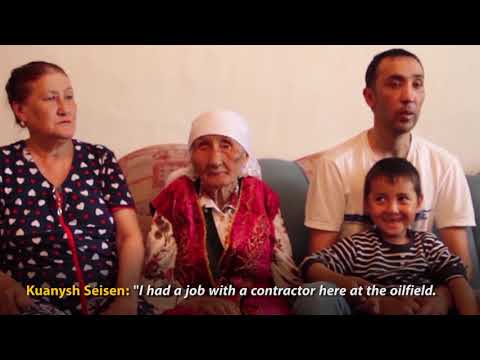(УРАЛЬСКАЯ НЕДЕЛЯ) “The Other Side of Oil” documentary depicts the lives of ordinary people living right beside the largest oil reserves in Western Kazakhstan. Through striking images of the Kazakh landscape, depictions of ordinary villagers’ lives, and extensive interviews with people who live right next to the richest oil reserves in the country, the documentary raises important issues of environmental degradation, social justice, and poverty.
The movie was directed, filmed, and produced by Lukpan Akhmedyarov and Raul Uporov of Uralskaya Nedelya (Uralsk Weekly) – one of the few independent news outlets in Kazakhstan.
The film crew visited three regions of Western Kazakhstan – Aktyubinsk, Mangystau, and Atyrau regions. Each of these territories is rich in oil reserves and, therefore, is attractive to foreign investors. Most of the oil sites mentioned in the documentary are developed by the subsidiaries of China National Petroleum Corporation(CNPC) and Korea National Oil Corporation (KNOC).
For local residents, close proximity to oil sites causes a multitude of health problems, diseases among and deaths of livestock, and subsequent loss of livelihood, water pollution, and many other indications of environmental degradation.
Among many concerns, interviewed villagers cited a lack of communication from oil companies, adequate grievance and compliance mechanisms, violations of labor rights, and retaliation for speaking up.
The film crew made several attempts to contact the oil companies for comment, but all of their requests for information were ignored.
“Both government agencies and oil companies should make efforts to improve the poor living conditions of local people. First of all, those efforts should be about adhering to environmental standards and labor rights,” says investigative journalist Lukpan Akhmedyarov.
“Right now, neither party is interested in strict observance of norms and laws because the status quo creates the conditions for corruption and significantly reduces the cost of oil production,” adds Akhmedyarov.
The documentary was filmed with the support of Crude Accountability. Crude Accountability consultant Sergey Solyanik, who provided his research and expert knowledge for the documentary, notes that government agencies are well aware of villagers’ environmental and social problems.
“Local residents repeatedly complained to the Aktyubinsk region authorities, but the environmental situation did not improve,” says Solyanik.
It is vital that any possible solution to the situation – from monitoring to resettlement – should involve discussions with local communities, according to Solyanik.
The Other Side of Oil premiered earlier this year in Russian and Kazakh, and received positive reviews in local media for its striking scenery and urgent message.











